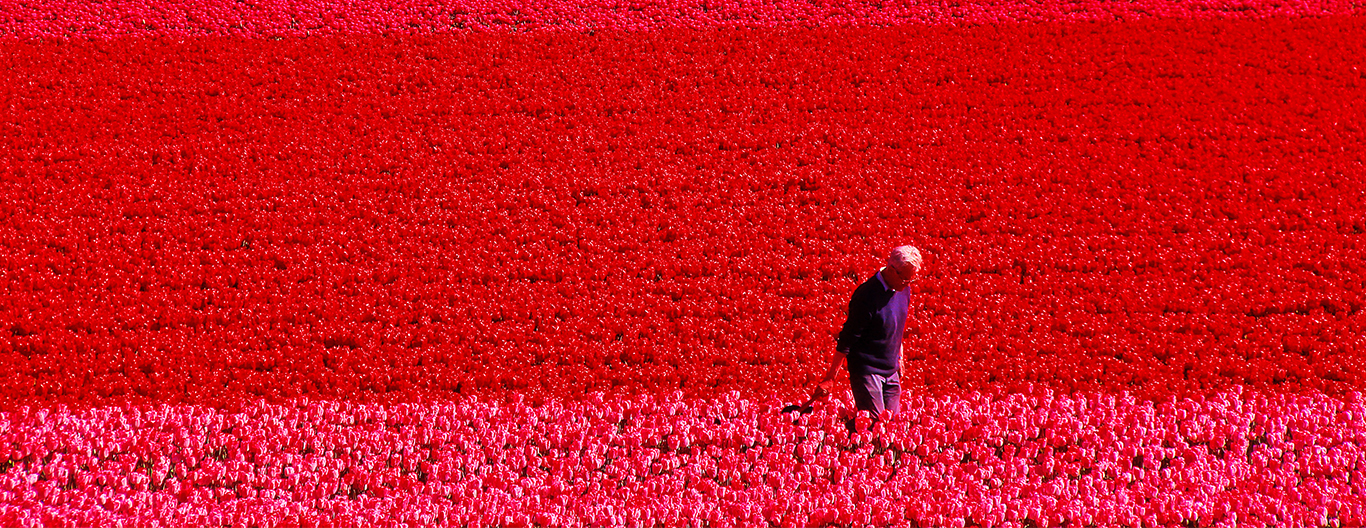A long-standing relationship between Royal FloraHolland and Rotterdam School of Management has led to a new era in smart markets. By improving the decision making process through valuable insight and Big Data analytics, the auction cooperative has been able to optimise profitability and efficiency in any auction day.
The Problem
With an annual turnover of €4.6bn and just under 3,000 employees, Royal FloraHolland is the largest plant and flower auction cooperative in the world. In 2016, 12.5bn plants and flowers were traded through this Dutch auction house, each of which would have been sold within hours and shipped to locations across the globe. For more than a century, Royal FloraHolland has been using a clock auction system to achieve the highest possible price within the shortest possible time – essential when dealing with a perishable product such as cut flowers. Over the years this system has changed very little, making it increasingly difficult to meet modern challenges. Researchers at the Rotterdam School of Management (RSM), Erasmus University in Holland, are addressing these issues, and using Big Data analytics they are helping the cooperative become more efficient and innovative.
At Royal FloraHolland, auctioneers begin each sale with a predetermined highest asking price, lowering it until a bid is made or a reserve price is reached. Prices are shown on a clock and buyers typically have only seconds to make a decision, which traditionally would be based on intuition. New and fast-paced technological developments in digitising information are placing a great deal of pressure on Royal FloraHolland to modernise its activities. Having already established a strong working relationship with RSM, the auction cooperative turned to the School for expertise in data analytics.
The Research
Professors Eric van Heck and Wolfgang Ketter – members of the RSM and Erasmus School of Economics’ Logistics and Information Systems (LIS) programme – were asked to carry out an objective study on the future of the Royal FloraHolland clock system. They investigated the Aalsmeer auction, one of the cooperative’s two trading centres, using insight from auctioneers and Big Data analytics to improve decision making in real time. The researchers began by analysing data on past bidding, the aim being to cluster buyers into various broad categories.
This allowed auctioneers to build an overview of bidders’ general types of behaviour, and therefore make informed decisions on how to set auction parameters, such as starting price and minimum purchase quantity. As a result, the auction cooperative can optimise profitability and efficiency in any auction day. The research team also investigated alternative scenarios to see what would happen when parameters were modified, so that various policy scenarios could be tested. Such laboratory and field experiments proved incredibly insightful, as well as beneficial to all parties involved: Royal FloraHolland was able to see the real-world effects of their decisions, while the researchers were given access to vast amounts of real-world data and knowledge from industry experts.
Professors Van Heck and Ketter, together with their PhD students, are currently looking into ‘multi-transaction’ auctioning and the effects of removing bidders’ IDs from the auctioning process. These two practices have been shown to have a substantial impact on prices, both for the auction and the buyers.
The Impact
Based on the team’s analysis, auctioneers can now make faster decisions and better tailor the auction for buyers. As a consequence, the auction has cleared out, on average, 25 minutes earlier each day, enabling flowers to be shipped off sooner to their customers. It also means that more flowers can be auctioned off in the time scheduled; and a greater number of buyers can purchase the flowers they need, which is particularly crucial during peak times around holidays. With the current analytics provided by the RSM researchers, the potential additional profit for the auction house has been substantial. The team is now working on developing smart, real-time decision support systems for growers, with plans to devise such support for bidders as well. The use of intelligent software agent technology can be implemented across the entire supply chain. The end goal is a very competitive supply chain in the world of cut flowers. Meanwhile, end customers also benefit from the process: more flowers make it to the market faster, resulting in more choice and fresher blooms.


